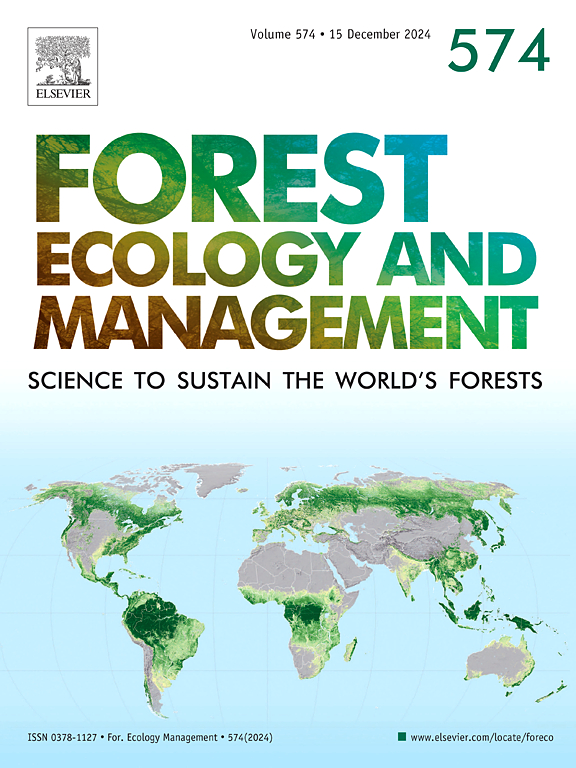利用长期监测数据提高风蚀风险模型 ForestGALES 的预测能力--一种统计校准方法
IF 3.7
2区 农林科学
Q1 FORESTRY
引用次数: 0
摘要
冬季风暴对德国森林造成严重破坏。不同的建模方法已被用于绘制濒危区域图,以通过林分适应将风灾风险降至最低。德国普遍采用的模型包括经验统计模型和混合机制模型,如 ForestGALES (FG)。到目前为止,FG 还没有在德国得到广泛应用,因为其参数化需要大量的实验工作,以得出对地区敏感的树种特定参数。在此,我们针对德国的森林条件,利用从单棵树木数据、土壤类型、地形(topex)和阵风速度数据中观察到的破坏情况,实施了一种统计校准方法。我们使用模拟退火法为挪威云杉、欧洲山毛榉和花旗松等树种生成新的特定树种值,挪威云杉和花旗松(欧洲山毛榉)的特定树种值在所有针叶树种(落叶树种)的范围内,每个树种的默认特定树种值周围还有 10% 的缓冲区。我们比较了两种优化方法:首先,我们的目标是最大限度地提高马修相关系数(MCC),该系数由混淆矩阵计算得出,分类阈值固定为 0.5。与在固定阈值下进行的优化相比,我们通过最大化从接收器-操作者特征(ROC)分析中直接生成的曲线下面积(AUC)值来优化物种特定参数。我们将所考虑物种的统计参数化与 FG 中目前实施的参数化进行了比较,并根据混淆矩阵和相关性能指标验证了由此产生的损害概率。我们为单棵树木和整个林地的风暴损害风险分析创建了不同的参数,并利用德国的阵风速度数据对其进行了验证。我们的结果表明,在单棵树方法中,所有树种的 MCC 都有所提高:在校准(验证)子集中,花旗松的MCC提高了0.26(0.22),挪威云杉的MCC提高了0.22(0.18),欧洲山毛榉的MCC提高了0.08(0.05)。林分方法的优化结果也显示出 MCC 的增加,但由于观测数据数量较少,结果不予考虑。我们的研究表明,对于德国森林而言,在没有拔树数据的情况下,可以通过统计优化提高 FG 的预测能力,这对于进一步创建 FG 的区域化可能很有价值。本文章由计算机程序翻译,如有差异,请以英文原文为准。
Improving the predictive capacity of the windthrow risk model ForestGALES with long-term monitoring data – A statistical calibration approach
Winter storms cause severe damage in German forests. Different modelling approaches have already been used to try and map endangered areas to minimize the risk of wind damage by stand adaption. Prevalent models for Germany include empirical-statistical and hybrid-mechanistic models, such as ForestGALES (FG). As of yet, FG is not extensively used in Germany as its parametrization requires extensive experimental efforts to derive regionally sensitive species-specific parameters. Here, we implement a statistical calibration approach for German forest conditions with observed damage from single tree data, soil types, topography (topex) and gust speed data. We use simulated annealing to generate new species-specific values for the tree species, Norway spruce, European beech, and Douglas fir from within the range of all coniferous (deciduous) species for Norway spruce and Douglas fir (European beech) and an additional 10 % buffer around the default species-specific values for each species. We compare two optimization approaches: First, we aim to maximize the Matthew’s correlation coefficient (MCC), which is calculated from the confusion matrix, applying a fixed classification threshold of 0.5. In comparison to the optimization at a fixed threshold, we optimized the species-specific parameters by maximizing the area-under-curve (AUC) value directly generated from the receiver-operator characteristic (ROC) analysis. We compare our statistical parametrizations for the considered species to those currently implemented in FG and validate the resulting damage probabilities based on confusion matrices and related performance measures. We created separate parametrizations for a single-tree and stand-wide analysis of storm damage risk, which we validated with gust speed data for Germany. Our results show, that for the single-tree method, MCC improved for all species: By 0.26 (0.22) for the calibration (validation) subset for Douglas fir, by 0.22 (0.18) for Norway spruce and by 0.08 (0.05) for European beech. The optimization for the stand-method shows an increase in MCC as well, with results not being considered due to low numbers of observation data. We show that for German forests, FG’s predictive capability can be improved by statistical optimization when no tree-pulling data is available, which could be valuable for creating further regionalizations of FG.
求助全文
通过发布文献求助,成功后即可免费获取论文全文。
去求助
来源期刊

Forest Ecology and Management
农林科学-林学
CiteScore
7.50
自引率
10.80%
发文量
665
审稿时长
39 days
期刊介绍:
Forest Ecology and Management publishes scientific articles linking forest ecology with forest management, focusing on the application of biological, ecological and social knowledge to the management and conservation of plantations and natural forests. The scope of the journal includes all forest ecosystems of the world.
A peer-review process ensures the quality and international interest of the manuscripts accepted for publication. The journal encourages communication between scientists in disparate fields who share a common interest in ecology and forest management, bridging the gap between research workers and forest managers.
We encourage submission of papers that will have the strongest interest and value to the Journal''s international readership. Some key features of papers with strong interest include:
1. Clear connections between the ecology and management of forests;
2. Novel ideas or approaches to important challenges in forest ecology and management;
3. Studies that address a population of interest beyond the scale of single research sites, Three key points in the design of forest experiments, Forest Ecology and Management 255 (2008) 2022-2023);
4. Review Articles on timely, important topics. Authors are welcome to contact one of the editors to discuss the suitability of a potential review manuscript.
The Journal encourages proposals for special issues examining important areas of forest ecology and management. Potential guest editors should contact any of the Editors to begin discussions about topics, potential papers, and other details.
 求助内容:
求助内容: 应助结果提醒方式:
应助结果提醒方式:


